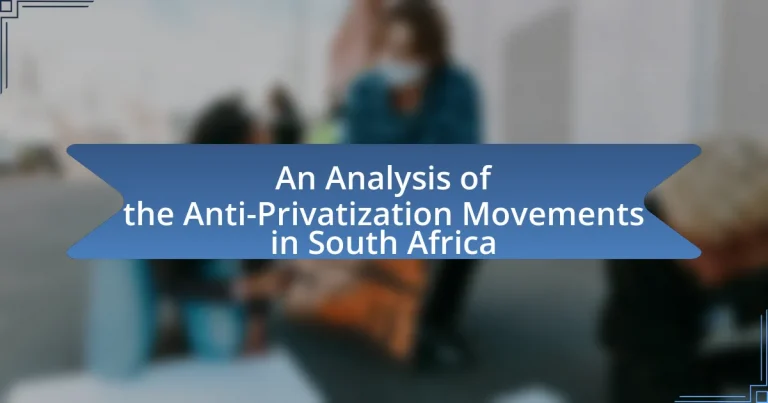The main entity of the article is the anti-privatization movements in South Africa, which are collective efforts opposing the privatization of public services and resources. The article provides an analysis of the emergence, objectives, and impacts of these movements, highlighting their response to neoliberal policies that prioritize privatization, particularly in essential sectors like water, electricity, and healthcare. It discusses the historical context, socio-economic factors, and key stakeholders involved, as well as the strategies employed by these movements to mobilize support and influence public policy. Additionally, the article examines the challenges faced by these movements and their implications for social cohesion and public perception of privatization in South Africa.

What are the Anti-Privatization Movements in South Africa?
Anti-privatization movements in South Africa are collective efforts aimed at opposing the privatization of public services and resources, emphasizing the need for public ownership and control. These movements have emerged in response to government policies that favor privatization, particularly in sectors like water, electricity, and healthcare, which activists argue lead to increased inequality and reduced access for marginalized communities. Notable examples include the Anti-Privatization Forum, which has organized protests and campaigns since the early 2000s, advocating for the rights of citizens to access essential services without profit motives. The movements are supported by various civil society organizations, trade unions, and community groups, highlighting the broader social implications of privatization in a country with a history of economic disparity.
Why did these movements emerge in South Africa?
Anti-privatization movements emerged in South Africa primarily due to widespread opposition to the neoliberal policies that prioritized privatization over public services. These movements were fueled by the negative impacts of privatization on access to essential services, such as water and electricity, which disproportionately affected marginalized communities. For instance, the introduction of privatized water services led to increased costs and reduced access for low-income households, sparking protests and mobilization efforts. Additionally, the legacy of apartheid, which left deep socio-economic inequalities, intensified the demand for equitable access to public resources, further driving the emergence of these movements.
What historical events contributed to the rise of anti-privatization sentiments?
The rise of anti-privatization sentiments in South Africa can be attributed to several historical events, including the end of apartheid and the subsequent economic policies implemented in the post-apartheid era. The transition from apartheid to a democratic government in 1994 led to expectations of improved public services and economic equity. However, the adoption of neoliberal policies, particularly during the late 1990s and early 2000s, resulted in the privatization of essential services such as water, electricity, and healthcare. This shift sparked widespread public discontent as many citizens experienced increased costs and reduced access to these services.
Additionally, significant events such as the 2000 anti-privatization protests in Johannesburg, where thousands rallied against the privatization of water services, highlighted the growing frustration among communities. The failure of privatized services to meet the needs of the population further fueled these sentiments, as evidenced by the rise of social movements like the Anti-Privatization Forum, which mobilized against the negative impacts of privatization on marginalized communities. These historical contexts illustrate the deep-rooted opposition to privatization in South Africa, driven by the desire for equitable access to essential services.
How do socio-economic factors influence these movements?
Socio-economic factors significantly influence anti-privatization movements in South Africa by shaping public sentiment and mobilizing collective action. Economic disparities, high unemployment rates, and inadequate access to essential services create a fertile ground for discontent, prompting communities to resist privatization efforts that threaten their livelihoods and social welfare. For instance, the 2015 protests against the privatization of water services in Johannesburg were driven by concerns over affordability and access, reflecting the broader socio-economic struggles faced by marginalized populations. Additionally, research by the South African Institute of Race Relations indicates that communities with lower socio-economic status are more likely to engage in protests against privatization, as they perceive these policies as exacerbating inequality and undermining their rights.
What are the main objectives of the anti-privatization movements?
The main objectives of the anti-privatization movements in South Africa include the preservation of public services, the protection of workers’ rights, and the promotion of social equity. These movements aim to prevent the transfer of public assets to private entities, which they argue can lead to increased costs and reduced access to essential services for marginalized communities. For instance, the anti-privatization movement has highlighted the negative impacts of privatization on water and electricity services, emphasizing that privatization often results in higher tariffs and decreased quality of service. Additionally, these movements advocate for democratic control over public resources, ensuring that decisions regarding public services reflect the needs and interests of the community rather than profit motives.
How do these objectives align with broader social justice goals?
The objectives of the anti-privatization movements in South Africa align with broader social justice goals by advocating for equitable access to essential services and resources. These movements aim to challenge the commodification of public goods, ensuring that all citizens, particularly marginalized communities, have the right to basic services such as water, education, and healthcare. For instance, the South African Constitution guarantees the right to access sufficient water, which these movements emphasize by opposing privatization that often leads to increased costs and reduced access for the poor. This alignment with social justice is further supported by the principles of equality and human dignity, which are central to both the movements and broader social justice frameworks.
What specific sectors are targeted by these movements?
The specific sectors targeted by the anti-privatization movements in South Africa include public utilities, healthcare, and education. These movements primarily focus on opposing the privatization of essential services such as water and electricity, which are seen as fundamental rights. For instance, the South African Municipal Workers’ Union has actively campaigned against the privatization of water services, arguing that it leads to increased costs and reduced access for marginalized communities. Additionally, the healthcare sector has faced scrutiny, with activists highlighting the negative impacts of privatization on public health access and quality. The education sector is also targeted, as privatization is perceived to exacerbate inequalities in access to quality education.
Who are the key stakeholders involved in these movements?
The key stakeholders involved in the anti-privatization movements in South Africa include labor unions, community organizations, political parties, and civil society groups. Labor unions, such as the Congress of South African Trade Unions (COSATU), actively oppose privatization due to concerns over job security and workers’ rights. Community organizations advocate for public services and access to resources, emphasizing the impact of privatization on marginalized communities. Political parties, particularly those aligned with leftist ideologies, support these movements to promote social equity and public ownership. Civil society groups, including non-governmental organizations, raise awareness and mobilize public opinion against privatization policies, highlighting their potential negative effects on social welfare and economic inequality.
What roles do grassroots organizations play in the anti-privatization efforts?
Grassroots organizations play a crucial role in anti-privatization efforts by mobilizing community members, raising awareness, and advocating for public ownership of essential services. These organizations often serve as a voice for marginalized populations, highlighting the negative impacts of privatization on access to basic needs such as water, education, and healthcare. For instance, in South Africa, groups like the Anti-Privatization Forum have organized protests and campaigns that successfully challenged government policies favoring privatization, demonstrating the effectiveness of grassroots activism in influencing public policy and fostering community solidarity.
How do political parties and government entities respond to these movements?
Political parties and government entities in South Africa respond to anti-privatization movements through a combination of policy adjustments, public statements, and legislative actions. For instance, the African National Congress (ANC), which has historically supported state ownership in key sectors, often emphasizes the importance of public services and community involvement in response to these movements. Additionally, government entities may engage in dialogue with activists to address concerns and propose alternatives to privatization, as seen in the debates surrounding the privatization of state-owned enterprises like Eskom and Transnet. This engagement is often backed by public sentiment, as surveys indicate that a significant portion of the population opposes privatization due to fears of job losses and reduced service quality.

How do Anti-Privatization Movements operate in South Africa?
Anti-privatization movements in South Africa operate through grassroots mobilization, advocacy, and legal challenges against privatization policies. These movements often involve community organizations, labor unions, and civil society groups that unite to resist the transfer of public services and assets to private entities. For instance, the Treatment Action Campaign has effectively mobilized public support against the privatization of healthcare services, highlighting the negative impacts on access and affordability. Additionally, the South African Municipal Workers’ Union has actively campaigned against the privatization of municipal services, arguing that it undermines workers’ rights and public accountability. These movements utilize protests, public awareness campaigns, and strategic litigation to influence policy decisions and protect public resources.
What strategies do these movements employ to mobilize support?
Anti-privatization movements in South Africa employ strategies such as grassroots organizing, coalition-building, and leveraging social media to mobilize support. Grassroots organizing involves engaging local communities through meetings and demonstrations, which fosters a sense of collective identity and urgency around the issues of privatization. Coalition-building with labor unions, civil society organizations, and political groups amplifies their reach and resources, as seen in the formation of the Anti-Privatization Forum in 2000, which united various stakeholders against privatization policies. Additionally, social media platforms are utilized to disseminate information rapidly, mobilize protests, and create awareness, exemplified by campaigns that have gained traction online, allowing movements to connect with a broader audience and coordinate actions effectively.
How do social media and technology facilitate activism?
Social media and technology facilitate activism by providing platforms for rapid communication, organization, and mobilization of supporters. These tools enable activists to share information, coordinate events, and amplify their messages to a broader audience. For instance, during the anti-privatization movements in South Africa, social media platforms like Twitter and Facebook were instrumental in organizing protests and disseminating information about government policies. Research indicates that social media can increase participation in social movements by up to 30%, demonstrating its effectiveness in engaging individuals and fostering community solidarity.
What role do protests and demonstrations play in their strategies?
Protests and demonstrations serve as critical tools for anti-privatization movements in South Africa, enabling them to mobilize public support and draw attention to their causes. These actions create visibility for issues surrounding privatization, such as the potential negative impacts on public services and community welfare. Historical instances, such as the 2000 anti-privatization protests in Johannesburg, illustrate how mass mobilization can influence policy discussions and raise awareness among policymakers and the general public. By demonstrating collective dissent, these movements can pressure the government to reconsider privatization initiatives, thereby reinforcing their strategic objectives.
How do these movements influence public policy?
Anti-privatization movements in South Africa influence public policy by mobilizing public opinion and advocating for government accountability in service delivery. These movements, such as the Anti-Privatization Forum, have successfully pressured policymakers to reconsider privatization initiatives by highlighting the negative impacts on access to essential services, particularly for marginalized communities. For instance, the widespread protests against the privatization of water services in the early 2000s led to policy reversals and the reaffirmation of public ownership in certain sectors. This demonstrates that sustained activism can reshape legislative agendas and promote policies that prioritize public welfare over profit motives.
What mechanisms are used to advocate for policy changes?
Advocacy for policy changes in the context of anti-privatization movements in South Africa employs several mechanisms, including grassroots mobilization, coalition building, public campaigns, and legal challenges. Grassroots mobilization involves organizing community members to participate in protests and demonstrations, which raises awareness and puts pressure on policymakers. Coalition building among various stakeholders, such as labor unions, civil society organizations, and political parties, strengthens the collective voice against privatization efforts. Public campaigns utilize media and social platforms to disseminate information and garner public support, while legal challenges can be pursued to contest privatization policies in courts, thereby leveraging the judicial system to protect public interests. These mechanisms have been evidenced in various anti-privatization initiatives, such as the 2015 protests against the privatization of water services in Johannesburg, which highlighted the community’s resistance and the importance of public resources.
How effective have these movements been in shaping legislation?
The anti-privatization movements in South Africa have been effective in shaping legislation, particularly in influencing policies related to public services and state ownership. For instance, the movements have led to the establishment of the Public Services Accountability Monitor, which advocates for transparency and accountability in public service delivery. Additionally, the 2018 National Health Insurance Bill reflects the influence of these movements, as it aims to expand access to healthcare without privatizing services. These legislative changes demonstrate the movements’ capacity to mobilize public opinion and pressure the government to reconsider privatization strategies, thereby reinforcing the importance of public ownership in essential services.
What challenges do anti-privatization movements face?
Anti-privatization movements in South Africa face significant challenges, including government resistance, lack of funding, and public apathy. Government entities often support privatization due to perceived economic benefits, making it difficult for movements to gain traction. Additionally, these movements frequently struggle with limited financial resources, which hampers their ability to mobilize and advocate effectively. Public apathy further complicates their efforts, as many citizens may not fully understand the implications of privatization or may prioritize immediate concerns over long-term issues. These factors collectively undermine the effectiveness and reach of anti-privatization initiatives in the country.
How do government responses impact the effectiveness of these movements?
Government responses significantly impact the effectiveness of anti-privatization movements in South Africa by either suppressing or facilitating public engagement and mobilization. For instance, when the South African government employs repressive measures, such as police violence or legal restrictions against protests, it often stifles dissent and diminishes the movements’ visibility and support, as seen during the 2012 Marikana massacre, where police action against striking miners led to widespread condemnation and increased scrutiny of government policies. Conversely, when the government engages in dialogue or addresses the concerns raised by these movements, it can enhance their legitimacy and effectiveness, as demonstrated by the 2018 commitment to review privatization policies in response to public outcry. Thus, the nature of government responses plays a crucial role in shaping the trajectory and outcomes of these movements.
What internal conflicts arise within the movements themselves?
Internal conflicts within the anti-privatization movements in South Africa primarily stem from ideological differences, leadership struggles, and varying priorities among groups. These movements often consist of diverse factions, each with distinct views on the best strategies to combat privatization, leading to disagreements on tactics and goals. For instance, some factions may prioritize immediate grassroots activism, while others advocate for legal challenges or political engagement, creating friction. Additionally, competition for resources and recognition can exacerbate tensions, as different groups vie for funding and public attention. Historical context shows that these conflicts have hindered the movements’ overall effectiveness, as seen in the fragmentation of coalitions during key protests and campaigns.

What are the impacts of Anti-Privatization Movements in South Africa?
Anti-Privatization Movements in South Africa have significantly influenced public policy and social dynamics. These movements have led to increased public awareness and mobilization against privatization, particularly in essential services like water, electricity, and healthcare. For instance, the 2000s saw widespread protests against the privatization of water services in cities like Johannesburg, which resulted in the government reconsidering its approach to service delivery. Additionally, these movements have fostered a stronger sense of community and solidarity among marginalized groups, as seen in the formation of coalitions such as the Anti-Privatization Forum. The impact is also evident in policy shifts, where the government has occasionally prioritized public ownership and community control over privatization, reflecting the demands of these movements.
How do these movements affect public perception of privatization?
Anti-privatization movements in South Africa significantly shape public perception of privatization by fostering skepticism and resistance towards privatization initiatives. These movements highlight concerns about the potential negative impacts of privatization, such as reduced access to essential services and increased inequality. For instance, protests and campaigns led by organizations like the Anti-Privatization Forum have raised awareness about the adverse effects of privatization on marginalized communities, leading to a broader public discourse that questions the efficacy and fairness of privatization policies. This heightened awareness often results in increased public opposition to privatization, as evidenced by survey data indicating that a majority of South Africans view privatization as detrimental to public welfare.
What narratives are constructed around privatization and public services?
Narratives constructed around privatization and public services often emphasize efficiency, cost reduction, and improved service delivery. Proponents argue that privatization leads to better management and innovation due to competition, as seen in sectors like telecommunications in South Africa, where privatization resulted in increased access and lower prices. Conversely, critics highlight the risks of reduced access and quality, particularly for marginalized communities, citing instances where privatized services have led to higher costs and inequitable access, such as in water supply cases in South Africa. These contrasting narratives reflect broader debates about the role of the state versus the market in providing essential services.
How do these narratives influence voter behavior and political engagement?
Narratives surrounding anti-privatization movements in South Africa significantly influence voter behavior and political engagement by shaping public perceptions of government policies and economic equity. These narratives often highlight the potential negative impacts of privatization on essential services, fostering a sense of urgency among voters to advocate for public ownership and accountability. For instance, the narrative that privatization leads to increased inequality resonates with voters who have experienced or witnessed the detrimental effects of service cuts and rising costs. This emotional appeal can mobilize communities, leading to higher voter turnout and increased participation in protests and political discussions. Research indicates that when voters perceive a direct threat to their access to basic services, such as water and healthcare, they are more likely to engage politically, as evidenced by the increased participation in local elections during periods of heightened anti-privatization activism.
What are the long-term implications of these movements on South African society?
The long-term implications of the anti-privatization movements on South African society include increased public awareness of social justice issues and a strengthened commitment to public ownership of essential services. These movements have mobilized communities to advocate for equitable access to resources, influencing policy discussions and leading to greater scrutiny of privatization initiatives. For instance, the anti-privatization protests in the early 2000s highlighted the negative impacts of privatization on water and electricity access, resulting in policy shifts that prioritize public service provision. This ongoing engagement fosters a culture of activism and civic participation, which is essential for democratic governance and social equity in South Africa.
How do anti-privatization movements contribute to social cohesion or division?
Anti-privatization movements contribute to social cohesion by uniting diverse groups around a common cause, fostering solidarity among communities affected by privatization policies. These movements often mobilize individuals from various socio-economic backgrounds, creating a collective identity that strengthens community ties and encourages collaborative action against perceived injustices. For instance, the anti-privatization protests in South Africa have brought together labor unions, civil society organizations, and grassroots activists, highlighting shared interests in public services and social equity. Conversely, these movements can also lead to social division, as they may polarize opinions between supporters of privatization, who argue for efficiency and economic growth, and opponents, who emphasize the importance of public ownership and access to essential services. This division can manifest in heightened tensions within communities, as differing views on privatization policies create rifts among residents. Overall, while anti-privatization movements can enhance social cohesion through collective action, they also risk deepening societal divisions based on conflicting economic ideologies.
What lessons can be learned from the successes and failures of these movements?
The lessons learned from the successes and failures of the anti-privatization movements in South Africa include the importance of grassroots mobilization and the need for clear, unified messaging. Successful movements, such as those opposing the privatization of water services, demonstrated that community engagement and collective action can effectively challenge government policies. For instance, the 2000 anti-privatization protests in Johannesburg highlighted how local organizations could unite diverse groups to advocate for public services. Conversely, failures often stemmed from a lack of coordination and internal divisions, as seen in the fragmented responses to the privatization of education, which weakened their overall impact. These experiences underscore that cohesive strategies and strong community ties are crucial for sustaining resistance against privatization efforts.
What practical steps can be taken to support anti-privatization efforts?
To support anti-privatization efforts, individuals and organizations can engage in grassroots mobilization, advocacy, and education campaigns. Grassroots mobilization involves organizing community meetings and protests to raise awareness about the negative impacts of privatization on public services, as seen in the South African context where privatization has led to increased costs and reduced access to essential services. Advocacy can include lobbying local and national governments to prioritize public ownership and investment in social services, which has been shown to improve service delivery and equity. Education campaigns can disseminate information about the benefits of public services versus privatized alternatives, highlighting case studies from South Africa where privatization has failed to deliver promised improvements. These steps collectively empower communities to resist privatization initiatives and promote public accountability.
How can individuals get involved in local anti-privatization initiatives?
Individuals can get involved in local anti-privatization initiatives by participating in community meetings, joining advocacy groups, and engaging in public campaigns. Community meetings often serve as platforms for discussing privatization issues and organizing collective actions. Advocacy groups, such as the Anti-Privatization Forum in South Africa, provide resources and networks for individuals to collaborate on initiatives. Public campaigns, including petitions and protests, raise awareness and mobilize support against privatization efforts. These actions have historically led to significant community engagement and policy discussions, demonstrating the effectiveness of grassroots involvement in shaping public discourse on privatization.
What resources are available for those interested in advocacy against privatization?
Resources available for those interested in advocacy against privatization include various organizations, publications, and online platforms. Notable organizations such as the Public Services International (PSI) and the South African Municipal Workers’ Union (SAMWU) provide tools and support for advocacy efforts. Publications like “The Case Against Privatization” by the Centre for Policy Studies offer critical analyses and data on the impacts of privatization. Additionally, online platforms such as the Anti-Privatization Forum facilitate networking and information sharing among activists. These resources collectively empower individuals and groups to effectively advocate against privatization initiatives in South Africa.


